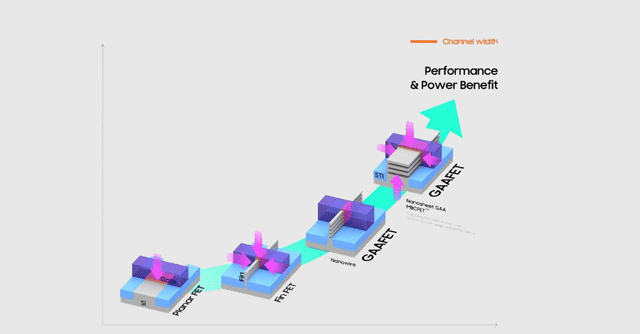
Samsung begins making 3nm chips ahead of iPhone supplier TSMC


Korean electronics group Samsung’s semiconductor division has beaten Taiwanese chipmaker TSMC to become the first company in the world to make 3nm chips. On Thursday, the company announced that it has begun production with its 3nm (nanometre) production process – a transistor architecture it calls Gate-All-Around (GAA). With this, the company officially has the most advanced semiconductor manufacturing process ahead of Taiwan Semiconductor Manufacturing Company (TSMC) – which notably manufactures chips for some of the biggest companies in the world.
During its announcement, Samsung said that its 3nm chips use 16% lesser surface area than production grade 5nm chips that are in the market right now, such as Apple’s A15 Bionic. The new chips will also consume 45% less power and deliver 23% higher performance, which are all fairly tall claims even for a generational jump in chip manufacturing technology. For instance, at nearly half the power consumption, 3nm chips can almost double the battery life that smartphones can offer.
The company also confirmed that it will also produce a second generation 3nm chip process, which will reduce the size of a chip by 35% over present 5nm ones, along with 30% performance upgrade (than 23% in the first gen 3nm chips), and 50% less power consumption than 5nm chips today.

During the announcement, Samsung said that the first production chips made on its 3nm process will be used in “high performance, low power” computing scenarios, before trickling down to mobile devices. However, there is no timeline for when Samsung's 3nm mobile processors become available in the market – although it is almost certainly not before 2023.
TSMC, meanwhile, hosted its 2022 Technology Symposium last month, where it offered a roadmap into its next generation products. The company said that its first production grade 3nm chips will enter the foundries in the “coming months”, and the first phones based on them would become available in the market in the first quarter of 2023.
Such a timeline suggests that even though Samsung may have beaten TSMC to the table with unveiling the production of its 3nm process, market dynamics may continue to sway TSMC’s way. A Bloomberg report noted that TSMC continues to hold over 50% of the world’s semiconductor supply market, which gives it the benefits of scaling its production faster than its rivals.

Samsung, on the other hand, will need to ensure that its chips match the cost of production that TSMC already offers its clients, in order to claw some of the latter’s market share away.
